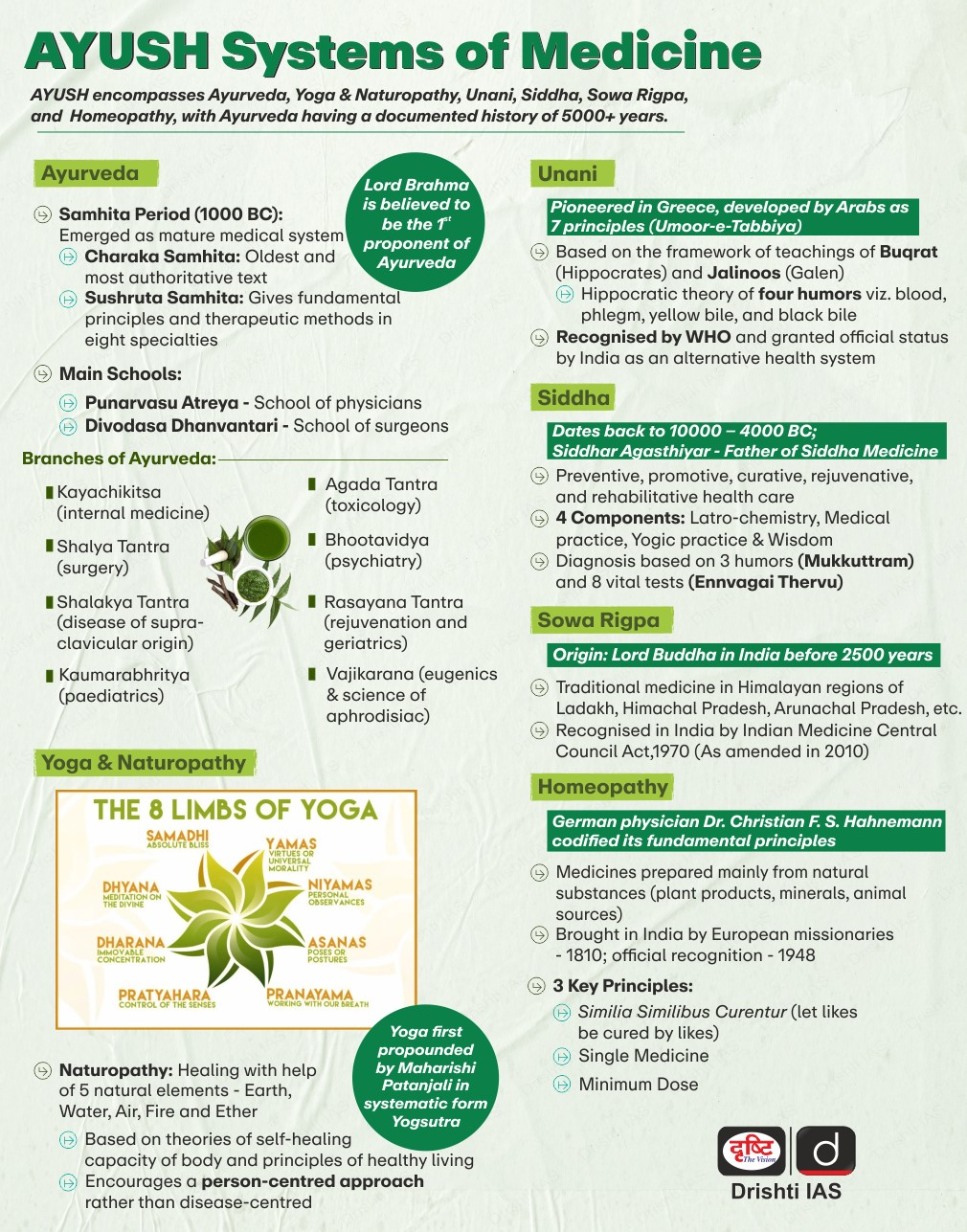Important Facts For Prelims
Ayurveda Day 2024
- 04 Nov 2024
- 4 min read
Why in News ?
The Ministry of Ayush celebrated 9th Ayurveda Day on 29th October, 2024 centered around the theme “Ayurveda Innovations for Global Health.”
- The PM launched several health projects, highlighting India's commitment to accessible Ayurveda.
What is Ayurveda?
- About: Ayurveda focuses on achieving balance in the body, mind and spirit to promote holistic wellbeing.
- The term Ayurveda is derived from two Sanskrit words: “ayu”, meaning life, and “veda”, meaning knowledge.
- Historical Context: Ayurveda, with origins dating back to the Vedas (5000–1000 BCE), is among the oldest healthcare systems.
- Ancient texts like the Ramayana and Mahabharata reference plant-based treatments and surgery.
- Around 1000 BCE, the Caraka and Susruta Samhitas established Ayurveda’s principles, later expanded by Vagbhata's Astanga Sangraha and Astanga Hridaya (Ayurvedic texts).
- By the 19th-20th centuries, India formalised Ayurveda education, creating structured programs and a thriving industry that supports public and private healthcare.
- Ancient texts like the Ramayana and Mahabharata reference plant-based treatments and surgery.
- Ayurveda Day: Since 2016, the Government of India has been observing Ayurveda Day every year on Dhanawantari Jayanti (Dhanteras) to raise awareness about Ayurvedic principles, medicinal herbs, and lifestyle practices.
- The knowledge of Ayurveda is attributed to Dhanawantari, the divine physician who received this knowledge from the Lord Brahma.
- International Reach: Ayurveda spread globally through trade and cultural exchanges, influencing traditional medicine practices in Tibet, China, and beyond.
- Ayurveda is now recognised as a traditional medicine system in 24 countries, with over 100 countries importing Ayurvedic products.
- This international acknowledgment is furthered by collaborative platforms like the Shanghai Cooperation Organisation (SCO) Expert Working Group, BIMSTEC Taskforce, and BRICS High-Level Forum on Traditional Medicine, which foster policy alignment and global healthcare integration.
- The World Health Organisation (WHO) included Ayurveda in the ICD-11 TM Module 2, allowing accurate documentation of Ayurvedic health interventions.
- WHO also set benchmarks for Ayurveda practice and training, raising global quality standards.
What is the Significance of the Theme?
- The theme focuses on fostering Ayurvedic innovation to address global health issues.
- Key Objectives Include:
- Combating non-communicable diseases (NCDs) and antimicrobial resistance.
- Addressing challenges related to climate change, geriatric and mental health, and nutritional disorders.
- Emphasizing preventive health and holistic wellness.
- Supporting the United Nations Sustainable Development Goals (SDGs) and Universal Health Coverage (UHC) vision.
- Key Focus Areas:
- Women’s Health: Utilising Ayurveda’s holistic methods to address women-specific health issues.
- Workplace Wellness: Applying Ayurvedic principles to support physical and mental health in work settings.
- School Wellness Programs: Promoting Ayurvedic wellness among children through practices that enhance immunity.
- Food Innovation: Advancing Ayurvedic dietary concepts and innovations by merging traditional approaches with modern culinary methods.
- By promoting preventive health and wellness, Ayurveda supports Sustainable Development Goal (SDG) 3 and Universal Health Coverage (UHC).
- Key Objectives Include:





